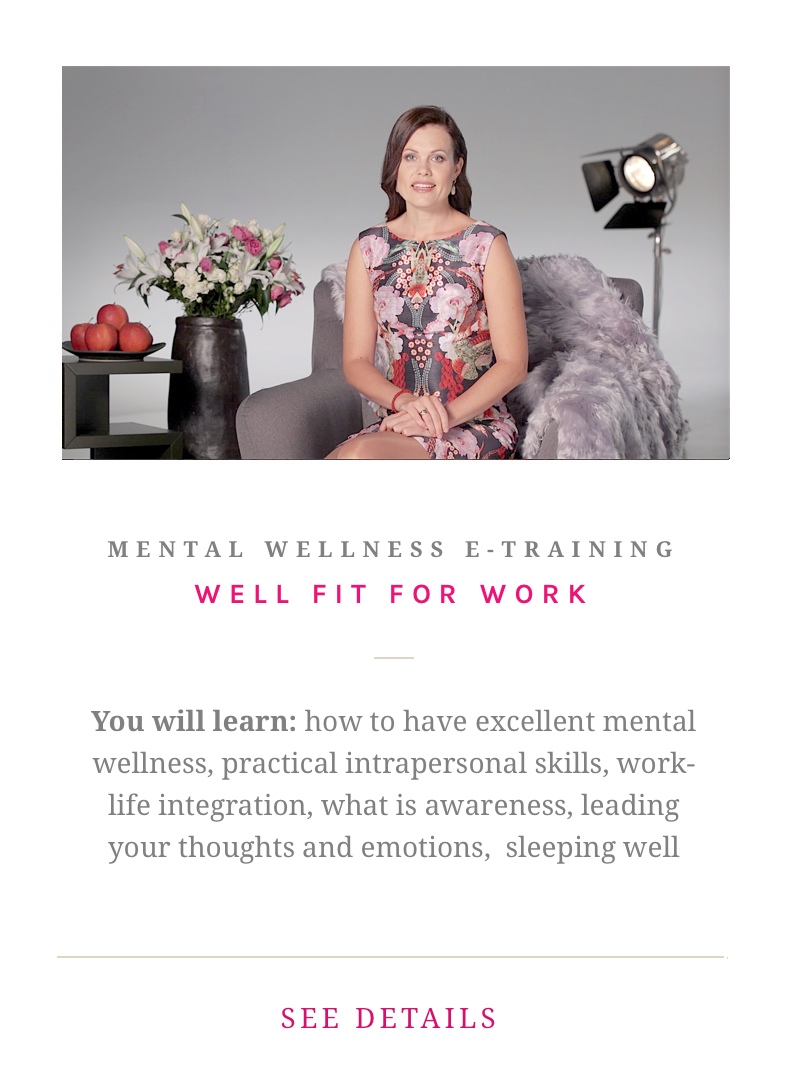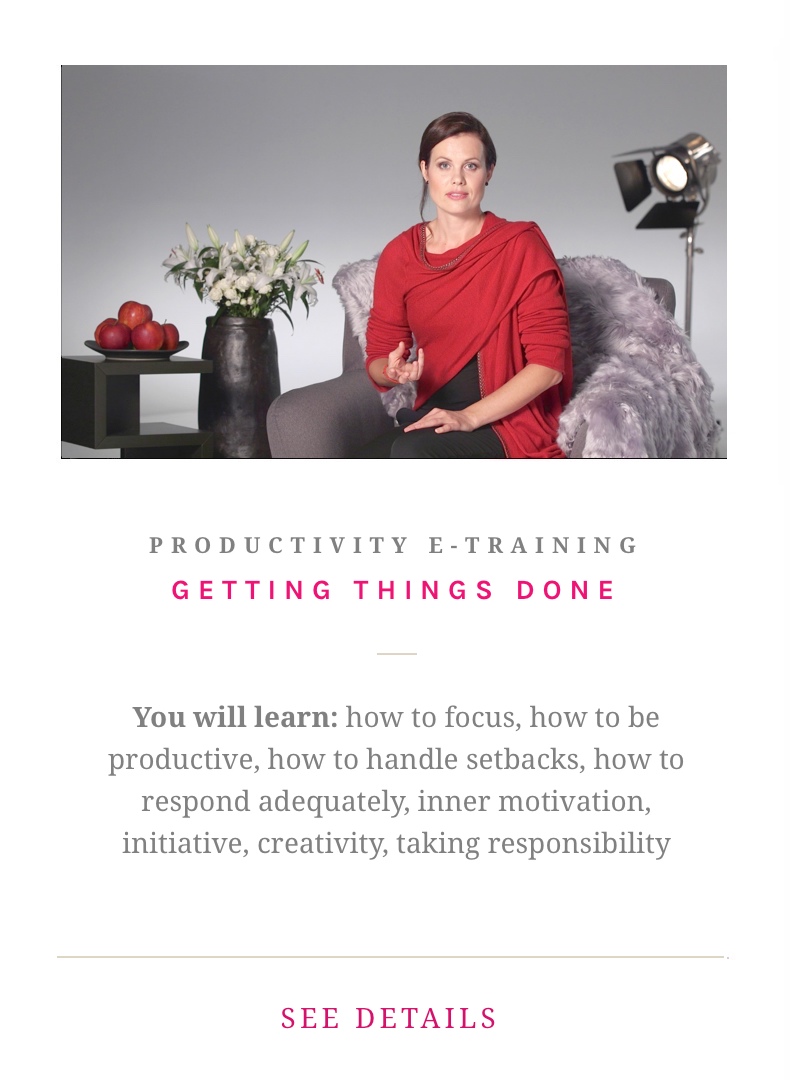Working with your mind is demanding, and your ability to maintain attention without inner pressures is crucial for success. With countless distractions vying for your focus, it's easy to become overwhelmed and lose sight of your initial goals.
A wandering mind becomes worried, anxious or stressed, and this leads to anxiety, burnout, depression and other mental health illnesses.
All work-related mental health issues develop slowly and never happen overnight. This makes those work-related mental health issues preventable, but it demands training your mind while you are still relatively well.
Proactive Workplace Mental Health Training
The World Health Organization (WHO) defines "Mental health is a state of mental well-being that enables people to cope with the stresses of life, realize their abilities, learn well and work well, and contribute to their community. It is an integral component of health and well-being that underpins our individual and collective abilities to make decisions, build relationships and shape the world we live in."
Mental health is a foundation for thriving, and a lack of mental wellness causes both mental and physical health problems. However, mental wellness skills are a glaring gap in the workplace. Why?
We study more mental illnesses than securing excellent mental wellness.

As a result, the WHO has claimed that depression and anxiety disorders are now the most common mental health issues worldwide and estimates that mental health issues result in an annual loss of $1 trillion in productivity globally.
Workplaces need to invest in strategies to promote and maintain employee mental health, to keep their best talent.
Up to now, most employers and employees have lacked access to a proactive mental health approach, as there is almost no mental wellness training for healthy people. The result of this is worrying, anxiousness, and a rise in higher stress levels, which slowly lead to burnout and mental health issues and lead to unacknowledged business loss.
The 2022 Deloitte UK report ‘Mental health and employers. The case for investment – pandemic and beyond' has audited the actual costs for employers in the UK and stated that the annual mental health loss per employee varies between £1035 ($1345 or 1150€) and £3,710 ($4820 or 4,120€) as shown on the graph below.
As this cost has more than direct sick-leave-related components, it is mostly unacknowledged by employers.
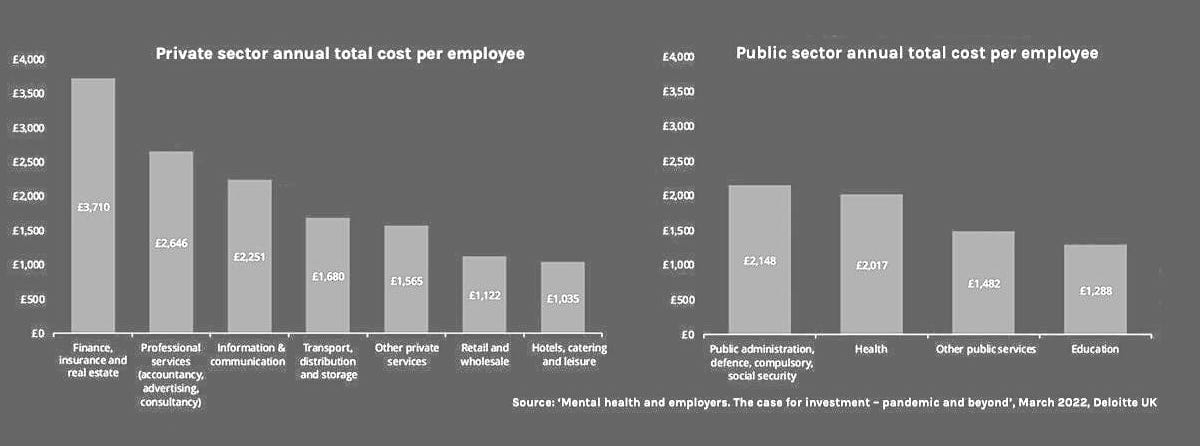
Only when workplaces start prioritizing the systematic reduction of stress and burnout and the prevention of mental health issues can they reduce these mental health costs. For this, training in mental wellness needs to become a norm.
How to sustain attention?
The pressing question is: how can you develop the intrapersonal skill of sustaining your attention, and how do you recover it when it wanes?
The solution lies in understanding what awareness is and how to lead it actively. Awareness is the most basic intrapersonal skill that you need for self-leadership.
Leading your awareness at will and accessing intrapersonal skills easily will form the foundation for cultivating sustained attention.
Such focus is necessary for success related to your professional work, as we live in a hyperconnected world where information overflows are distracting.
Noticing the needed information and keeping your attention where it needs to stay empowers your productivity. People with sustained focus are more engaged and less disturbed by different external events around them.
As our schools lack intrapersonal education and mental wellness lessons, securing mental wellness isn't something that people can figure out on their own, without training their minds first.
The reactive approaches to mental wellness and lack of proactive mental wellness training mean that only 21% of employees are actively engaged (see the Gallup employee engagement levels graph below).

The graph above indicates the true hidden potential of employee engagement, as in best practice teams, around 70% of employees are engaged and thrive. So, securing mental health training proactively for everyone in your team allows you to improve employee engagement, but the key to this is improving attention.
The new proactive workplace mental wellness approach secures health, productivity, and employee engagement at the same time.
Awareness: The Key to Sustaining Attention and Self-monitoring of Mental Health
The easiest way to explain attention is, it is consciously directed awareness. Awareness allows you to spot and direct where your attention is.
Awareness also allows you to realize when your thoughts, imagination, and emotions take you out of your center and make you lose your attention, thereby impacting your performance at work.
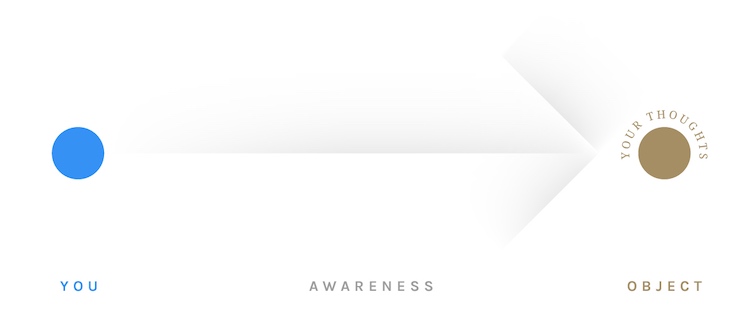
Illustration of the arrow of awareness between you and the object. Source: Ingvar Villido; illustration design by Jürgen Salenbacher.
By using awareness to observe your internal states, you can recognize the forces that disrupt your attention. Having good intrapersonal skills allows you to alter such disruptions and nip all inner problems in the bud.
When you or your teammate joins mental wellness training on this website, it starts with a deeper self-evaluation test, which enables you to notice what you need to change in your inner domain to keep your mind fit and well.
While some distractions might be external, such as the endless buzz of notifications, most are internal, such as persistent automatic thoughts, imaginations or emotional reactions that cloud your attention.
When you become more conscious of events in your mind, you can begin to notice and alter reactive patterns.
Whether it is your anxiousness about an upcoming event or worry or stress about past events, such automatic emotional reactions can divert your attention from the present. Awareness, then, is not just about observing; it’s about reclaiming your inner control over how you direct your attention.
The Foundation of Attention: Awareness and Self-Leadership
The key to developing and sustaining attention lies in learning to lead your awareness and possess good intrapersonal skills.
Intrapersonal skills are something that you and others in your team can easily learn.
Awareness allows you to recognize where your mental and emotional energy is directed and understand inner processes that may influence your focus. Differentiating processes in your mind will improve self-leadership and empower you to use conscious response over automatic inner reactivity.
Self-leadership involves actively managing both internal and external distractions and allows you to lead your different activities within time and on time. By scheduling focused work sessions and minimizing distractions, you can create a calmer environment for focus-demanding work tasks.
Setting clear goals and breaking down your tasks into smaller, manageable steps can help you maintain your focus and prevent overwhelm.
While it may seem counterintuitive, taking regular breaks is crucial for sustaining attention over long periods. Short breaks allow our minds to rest and recharge, preventing mental fatigue and improving our ability to concentrate.
Securing Workplace Mental Health Training for All
Investing in workplace mental health trainings made available on this website will provide you and your employees with the intrapersonal tools and strategies needed to cultivate attention and self-leadership.
|
Our mental wellness trainings cover topics from leading your awareness to stress reduction and burnout prevention. We also cover efficient time management and proactive mental health tactics, and empower individuals to enhance their well-being and performance.
Securing excellent mental wellness and good intrapersonal skills brings the following benefits:
- You become more productive and engaged with what you do as your attention span improves;
- Your inner reactivity is reduced, and thus you become less distracted and irritated;
- Your mind becomes more stress-free, which reduces your burnout risk;
- Interpersonal relations and teamwork will improve;
- You become more present, not just mindful, but more aware of the actual situation and better at sustaining focus.
Those benefits are achievable for you and the people in your team when you start looking after your intrapersonal domain, just as you look after your physical body. Training the physical fitness alone doesn't secure mental fitness.
Once you learn practical intrapersonal skills and apply them, you can experience a life that has a much higher inner degree of responsibility and freedom.
Knowing how to lead your attention and other inner processes makes even extremely stressful situations less stressful within your mind.
We aim to allow you to become the calmest person in the room, so that you can be productive when needed, rest before you get tired, and enjoy work and life..
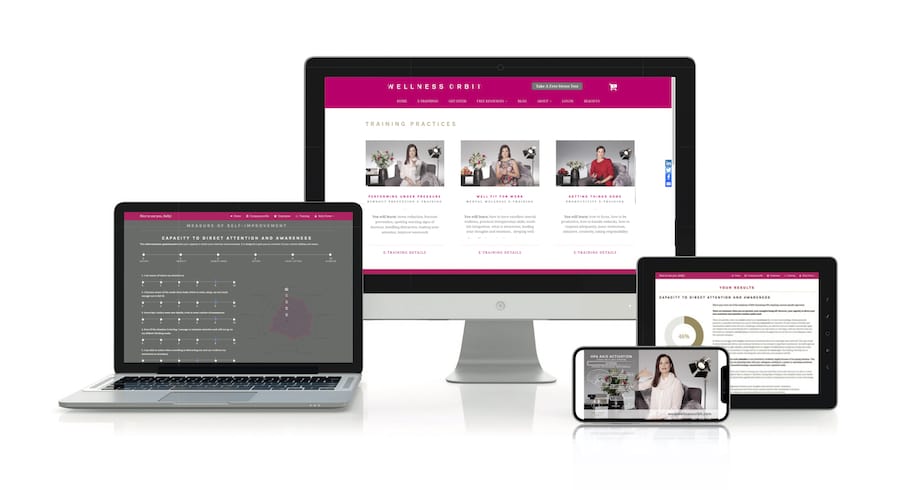
Conclusion
By developing strong attention and practical intrapersonal skills, you and your team can improve productivity, creativity, and overall well-being.
Professionals take a long time to train, and people who love their work and work intensively are the most vulnerable to stress and burnout. Reducing stress and preventing burnout are the key factors in the prevention of mental health issues at work.
Online workplace mental health training equips you and your team with the intrapersonal skills that allow thriving in today's demanding work situations. Before you move on, watch the video below and then click the demo training button above! Mental wellness is a great investment.



